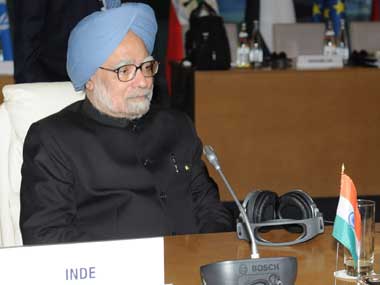Sonia Gandhi’s controversial Food Security Bill has a ticking time-bomb inside.
While it is well known that priority households will get rice, wheat or coarse grains at throwaway prices of Rs 3, Rs 2 and Re 1 a kg, a small clause inserted in the Bill will ensure that these prices may become politically impossible to change.
According to BusinessLine, the Bill has replaced the original intended phrase of “not less than"s 3, Rs 2 and Re 1 by the words “not exceeding”.
This shift in phrasing means that if ever the government wants to raise the price of over-subsidised grain, it will have to get the law amended by Parliament.
[caption id=“attachment_164165” align=“alignleft” width=“380” caption=“Worried about food security. Image courtesy PIB”]  [/caption]
This is a ticking time-bomb since price increases will not merely be an executive decision of the government, but will call for debates and discussions in Parliament. One can bet that no political party will ever call for raising prices, even when they become uneconomical.
This change in phrasing is dangerous because the prime controversy relating to the Food Bill is its potential cost. While the Bill’s backers have put the annual subsidy costs at around Rs 95,000-1,00,000 crore, critics feel the numbers have been deliberately understated to get the Bill passed.
Ashok Gulati, chairman of the Commission on Agricultural Costs and Prices, says that annual costs could add up to around Rs 2,00,000 crore in the first three years ( total: Rs 6,00,000 crore), especially since infrastructure to procure, store and move the grain will have to be created.
The ticking time-bomb will give the Bill’s critics further ammunition, but one critic who has had to accept defeat at Sonia Gandhi’s hands is none other than Prime Minister Manmohan Singh himself.
According to Samar Halarnkar in the Hindustan Times, “One of the biggest opponents of the Food Bill is PM Manmohan Singh, who has been having a sometimes tense backroom tussle with his boss, UPA chairperson Sonia Gandhi. On Singh’s cue, many ministers in recent Cabinet meetings have expressed disquiet over the Food Bill….”.
Among the dissenters are Agriculture Minister Sharad Pawar, who has spoken out about its costs and the challenge for food production.
Both Singh and Pawar have had to eat crow.
But the dissent isn’t ending. Some of the strong backers of the bill are uncomfortable with its centralised design. Jean Dreze, a former member of the National Advisory Council, told _Firstpost_ in an exclusive interview : “I think that the bill gives excessive powers to the central government to specify the time frame, the sharing of costs with state governments, the details of people’s entitlements, and the identification criteria. State governments have particularly good reasons to resist the imposition of a rigid framework for the PDS on the Central government’s own terms. They should insist on greater flexibility.”
Some states have already dissented. Tamil Nadu Chief Minister J Jayalalithaa has dashed off a letter to the prime minister seeking an exemption for the state. “In a federal structure like ours where the states are in close and direct contact with the people, the choice of designing and implementing popular welfare schemes is best left to the states. The Union government should not attempt or be seen to attempt encroaching into the domains of the states,” she said.
Dipali Rastogi, Commissioner of Food and Civil Supplies in Madhya Pradesh, speaking in her personal capacity, thinks the Food Bill is more about patronising the poor than about reducing hunger. Writing in the Indian Express, she says: “A direct-subsidy-oriented approach that seeks to feed ’those hungry mouths’ is a form of neo-colonialism, which will only seek to cripple our poor and ensure that they remain poor for generations. An intensive rural infrastructure-building approach through their participation can achieve, in some measure, what the food security bill never can to remove poverty.”
With a time-bomb ticking away in the fine-print of the bill, it is only a matter of time before it blows up, either politically or economically, or both.


)
)
)
)
)
)
)
)
)



